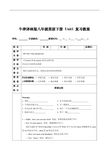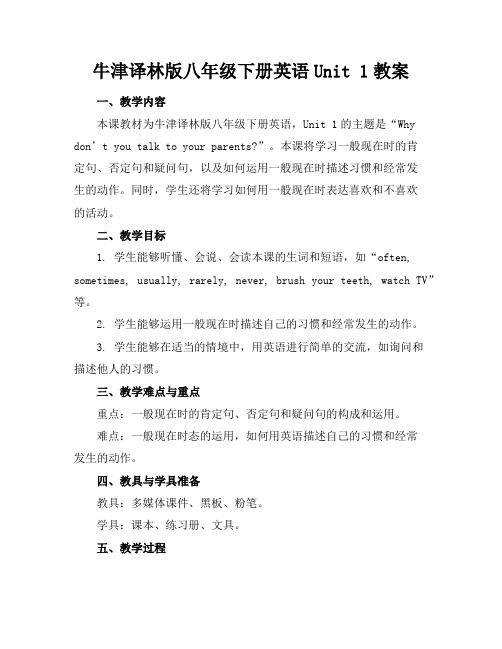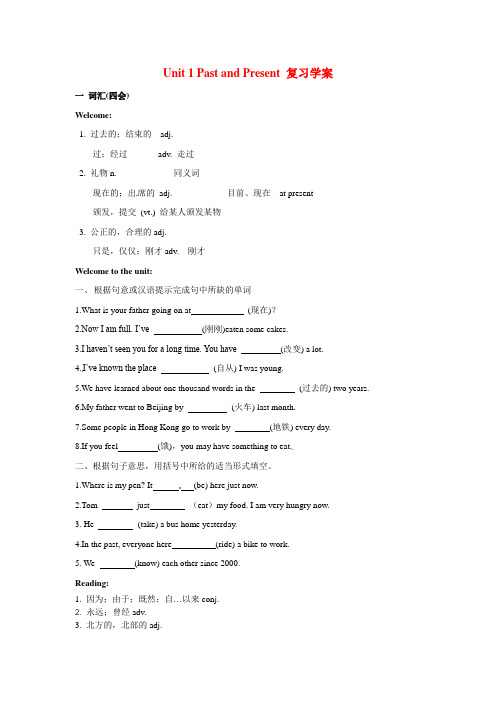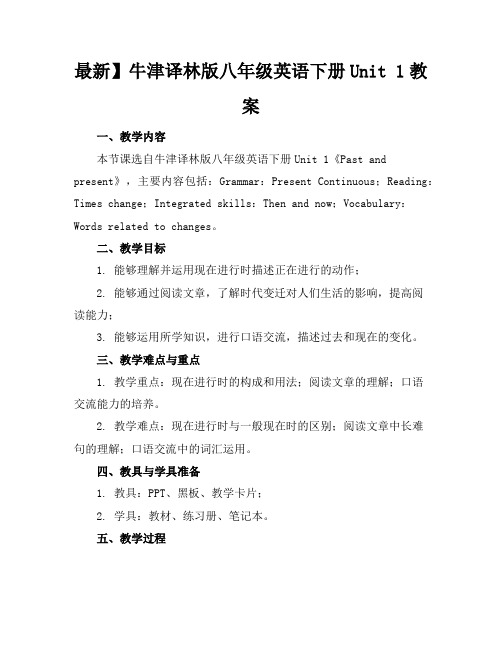牛津译林八年级下册英语Unit1复习学案设计
最新】牛津译林版八年级英语下册Unit1教案

最新】牛津译林版八年级英语下册Unit 1教案一、教学内容本节课选自牛津译林版八年级英语下册Unit 1《Past and present》,主要围绕“变化”这一主题展开,包括Chapter 1和Chapter 2两个章节。
教学内容涵盖了:了解和描述过去与现在生活的变化;运用一般过去时和一般现在时描述事物的变化;学会使用比较级和最高级表达程度。
二、教学目标1. 能够听懂并准确运用一般过去时和一般现在时描述过去与现在的变化。
2. 能够运用比较级和最高级表达事物的程度。
3. 能够通过小组合作,用英语进行讨论,分享对过去与现在生活的看法。
三、教学难点与重点1. 教学难点:一般过去时和一般现在时的运用;比较级和最高级的运用。
2. 教学重点:通过对比过去与现在的生活,学会运用目标语法进行描述。
四、教具与学具准备1. 教具:多媒体设备、PPT、黑板、粉笔。
2. 学具:教材、练习册、笔记本。
五、教学过程1. 引入:通过展示一组过去与现在的图片,让学生观察并讨论变化,激发学生兴趣。
2. 呈现:呈现Chapter 1和Chapter 2的内容,引导学生学习一般过去时和一般现在时,以及比较级和最高级。
3. 实践:进行小组活动,让学生用目标语法描述过去与现在的变化。
4. 例题讲解:讲解教材中的典型例题,帮助学生掌握语法知识。
5. 随堂练习:设计相关练习题,让学生及时巩固所学知识。
六、板书设计1. Unit 1 Past and present2. 主要语法:一般过去时:主语 + 动词过去式一般现在时:主语 + 动词原形比较级和最高级:形容词/副词的比较级和最高级七、作业设计1. 作业题目:a) 根据所给图片,运用一般过去时和一般现在时描述过去与现在的变化。
2. 答案:b) 例如:This movie is more interesting than that one. This is the most interesting movie I have ever seen.八、课后反思及拓展延伸2. 拓展延伸:鼓励学生在课后观察生活中的变化,用英语记录下来,并在下节课进行分享。
牛津译林版八年级英语下册 Unit1 复习教案

牛津译林版八年级英语下册Unit1 复习教案学科:任课教师:授课时间:年月日时:分姓名性别年级总课时:教学内容8B Unit 1 Past and present教学目标①Used to和be used to的含义的区别②过去分词的变化规则重点难点现在完成时的含义、结构以及时间状语的辨别课前检查作业完成情况:○ 全部完成○ 基本完成○部分完成○ 没有完成上次授课回顾:○ 完全掌握○ 基本掌握○ 部分掌握○ 没有掌握难点标记授课过程Welcome1. 曾经____________________2. 在不同的时期__________________3. 不同的交通方式________________4. 写一篇报告_______________________5. 在过去的100多年里____________6. 进行一个历史课题探究_____________7. 轮流讨论它____________ 8. 等下一辆_____________1. ---Eddie,have you seen my food? 埃迪,你看到我的食物了吗?---Yes. I've just eaten it. 是的。
我刚刚把它吃了。
现在完成时由“助动词have/has+过去分词”构成,其中I've是I have的缩略形式,seen 是see的过去分词,eaten是eat的过去分词。
--- Have you eaten your breakfast? 你吃过早饭了吗?--- Yes,I have. 是的,我吃过了。
( )- Would you like to go and see Avatar with me tonight?- Thank you very much, but I_______ it already.A. seeB. will seeC. have seenD. am seeing2.You've eaten my food?你吃了我的食物?本句为陈述句,但句末用问号,表示疑问。
牛津译林版八年级下册英语Unit1教案

牛津译林版八年级下册英语Unit 1教案一、教学内容本课教材为牛津译林版八年级下册英语,Unit 1的主题是“Why don’t you talk to your parents?”。
本课将学习一般现在时的肯定句、否定句和疑问句,以及如何运用一般现在时描述习惯和经常发生的动作。
同时,学生还将学习如何用一般现在时表达喜欢和不喜欢的活动。
二、教学目标1. 学生能够听懂、会说、会读本课的生词和短语,如“often, sometimes, usually, rarely, never, brush your teeth, watch TV”等。
2. 学生能够运用一般现在时描述自己的习惯和经常发生的动作。
3. 学生能够在适当的情境中,用英语进行简单的交流,如询问和描述他人的习惯。
三、教学难点与重点重点:一般现在时的肯定句、否定句和疑问句的构成和运用。
难点:一般现在时态的运用,如何用英语描述自己的习惯和经常发生的动作。
四、教具与学具准备教具:多媒体课件、黑板、粉笔。
学具:课本、练习册、文具。
五、教学过程1. 情景引入:教师通过展示一幅图片,图片中有一个男孩在刷牙,一个女孩在看电视,引发学生对日常习惯的讨论。
2. 新课导入:教师引导学生学习一般现在时的肯定句、否定句和疑问句,并通过例句和练习让学生掌握一般现在时的构成和运用。
3. 课堂实践:教师设计一些情境,让学生运用一般现在时进行角色扮演和小组讨论,如描述自己的日常习惯,询问和描述他人的习惯等。
4. 随堂练习:教师给出一些练习题,让学生独立完成,检验学生对一般现在时的掌握程度。
六、板书设计板书内容:一般现在时肯定句:主语 + 动词原形否定句:主语 + don't/doesn't/does not + 动词原形疑问句:Do/Does/Doesn't + 主语 + 动词原形?七、作业设计1. 作业题目:用一般现在时描述你的日常习惯,并写一篇短文介绍你的朋友。
牛津译林版英语八下Unit 1《Past and Present》(Task)教学设计

牛津译林版英语八下Unit 1《Past and Present》(Task)教学设计一. 教材分析牛津译林版英语八下Unit 1《Past and Present》主要介绍了人们的生活在过去和现在是如何变化的。
通过对比过去和现在的生活,让学生学会使用过去时和现在时描述事物的变化。
本课时的Task部分主要让学生学会如何根据自己的需求选择合适的住房。
本节课的主要话题是房屋租赁和购买,学生需要掌握相关的词汇和句型,以及学会如何进行房屋租赁和购买的对话。
二. 学情分析学生在学习本节课之前,已经掌握了如何描述过去和现在的生活的语法知识,同时也具备了一定的房屋租赁和购买的相关词汇。
但是,学生对于如何在实际场景中运用这些知识和词汇进行对话还存在一定的困难。
因此,在教学过程中,教师需要帮助学生将这些知识和词汇应用到实际场景中,提高学生的实际语言运用能力。
三. 教学目标1.知识目标:–学生能够掌握并运用相关的词汇和句型描述房屋租赁和购买的情况。
–学生能够通过对比过去和现在的生活,学会使用过去时和现在时描述事物的变化。
2.能力目标:–学生能够在实际场景中运用所学的知识和词汇进行对话。
–学生能够提高自己的听、说、读、写的能力。
3.情感目标:–学生能够通过学习本节课,增强对英语学习的兴趣。
–学生能够学会如何根据自己的需求选择合适的住房。
四. 教学重难点•学生能够掌握并运用相关的词汇和句型描述房屋租赁和购买的情况。
•学生能够通过对比过去和现在的生活,学会使用过去时和现在时描述事物的变化。
•学生能够在实际场景中运用所学的知识和词汇进行对话。
•学生能够学会如何根据自己的需求选择合适的住房。
五. 教学方法1.情境教学法:通过设定真实的房屋租赁和购买的场景,让学生在实际情境中学习并运用所学的知识和词汇。
2.任务型教学法:通过完成具体的任务,让学生学会如何根据自己的需求选择合适的住房。
3.交际法:通过小组讨论和角色扮演等方式,让学生在课堂上进行真实的交际,提高学生的听、说、读、写的能力。
【最新】牛津译林版八年级英语下册Unit 1 Past and Present 复习学案

Unit 1 Past and Present 复习学案一词汇(四会)Welcome:1. 过去的;结束的adj. ____________过;经过adv. 走过____________________2. 礼物n. _________ 同义词_________现在的;出席的adj. ____________目前、现在at present颁发,提交(vt.) 给某人颁发某物__________________3. 公正的,合理的adj.____________只是,仅仅;刚才adv. 刚才_____________________Welcome to the unit:一、根据句意或汉语提示完成句中所缺的单词1.What is your father going on at (现在)?2.Now I am full. I’ve (刚刚)eaten some cakes.3.I haven’t seen you for a long time. You have (改变) a lot.4.I’ve known the place (自从) I was young.5.We have learned about one thousand words in the (过去的) two years.6.My father went to Beijing by (火车) last month.7.Some people in Hong Kong go to work by (地铁) every day.8.If you feel (饿),you may have something to eat.二、根据句子意思,用括号中所给的适当形式填空。
1.Where is my pen? It (be) here just now.2.Tom just (eat)my food. I am very hungry now.3. He (take) a bus home yesterday.4.In the past, everyone here (ride) a bike to work.5. We (know) each other since 2000.Reading:1. 因为;由于;既然;自…以来conj.2.永远;曾经adv.3. 北方的,北部的adj.n._________ —在…北方______________________/______________________-南方n._____________—adj____________./东方n_________.—adj____________./西方n.__________—adj_____________to the+方位名词+of...指互不接壤并互不管辖的两个地区.例:Japan is to the east of China.日本在中国以东.(不接壤)in the +方位名词+of...指在某一范围内的地区.例:Beijing is in the north of China.北京在中国的北部.(在内部)on the+方位名词+of...指相互接壤并互不管辖的两个地区例:The Pacific is on the east of China.太平洋在中国的东面.(接壤)4. 已婚的;与…结为夫妻的;婚姻的adj. _____________v._________ 与某人结婚____________________/______________________已经结婚多长时间________________________________________________5. 妻子n. _________pl.______________6. 块;街区n. __________7.(表示方向)越过;(部份或全部覆盖)在…上面;超过;(表示论及)关于prep. ___________ 翻过这座山_______________________ 结束adv._________ 放学____________8. 污染n.___________光、水、噪音,空气污染__________________________________被污染9. 工厂,制造厂n. __________________10. 浪费,白费n. __________________徒劳;(使)损耗;(使)消瘦;浪费vt.& vi. _____________waste sth. = _________________11. 实现;了解,意识到vt. ______________12. 形势,处境_______________ 改善形势__________________13. 不管到什么程度;无论如何;然而adv.___________________14. 不可能的,做不到的adj. ______________ 反义词________________15. prep. 在…之前_____________ 饭前__________________16. 孤独的,孤单的;寂寞的;荒凉的adj. ___________________感到孤独_____________________;一座荒凉的岛__________________________单独的;独一无二的;独自的adj.单独地;独自地;孤独地;只,只有adv. 独自呆在家里___________________18. 无论如何;而且;尽管adv._____________19. 丈夫n. ___________________20. 接见;采访;面试;会谈n. _________________面试vt.& vi.采访;访问;会见;(私下)提问vt.采访某人______________________________/________________________________Reading:一、根据句意或汉语提示完成句中所缺的单词1.The park is in the (北部的)part of the city.2.Their (妻子)are all nurses.3.We lived together till 1965 when I got (结婚)。
牛津译林版八年级下册英语Unit 1教学设计

牛津译林版八年级下册英语Unit 1教学设计一. 教材分析牛津译林版八年级下册英语Unit 1的主题是“How do you get to school?”,主要让学生掌握一般现在时的疑问句和回答,以及常用的交通工具和介词短语。
本单元还包括一个关于一个男孩如何去学校的故事,通过这个故事,学生可以更好地理解一般现在时的用法和相关的交通工具词汇。
二. 学情分析八年级的学生已经掌握了基本的英语语法和词汇,对一般现在时有一定的了解。
但是,他们的口语表达能力还不够强,需要通过大量的操练来提高。
此外,他们对不同的交通工具和介词短语可能还不太熟悉,需要通过实例和活动来加深理解。
三. 教学目标1.能够用一般现在时提问和回答关于如何去学校的问题。
2.能够正确使用常用的交通工具和介词短语。
3.能够听懂并讲述故事,理解故事的主旨和细节。
4.能够通过合作和交流,提高口语表达能力。
四. 教学重难点1.重点:一般现在时的疑问句和回答,常用的交通工具和介词短语。
2.难点:一般现在时的疑问句的构成和用法,以及介词短语的搭配。
五. 教学方法1.任务型教学法:通过设置不同的任务,让学生在实际情境中运用所学知识。
2.交际型教学法:通过小组讨论和角色扮演,提高学生的口语表达能力。
3.情境教学法:通过故事和图片,创设真实的情境,让学生更好地理解和学习。
六. 教学准备1.PPT和教学图片。
2.故事书和听力材料。
3.录音机和耳机。
4.黑板和粉笔。
七. 教学过程1.导入(5分钟)通过提问学生如何去学校,引出本课的主题。
然后,让学生看图片,猜测故事的主人公和他的交通工具,激发学生的兴趣。
2.呈现(10分钟)让学生听故事,并回答相关问题。
然后,让学生看PPT,呈现故事的主要内容和人物的 transportation,让学生理解和记忆常用的交通工具和介词短语。
3.操练(10分钟)让学生分成小组,用一般现在时提问和回答如何去学校的问题。
鼓励学生使用常用的交通工具和介词短语。
最新】牛津译林版八年级英语下册Unit1教案

最新】牛津译林版八年级英语下册Unit 1教案一、教学内容本节课选自牛津译林版八年级英语下册Unit 1《Past and present》,主要内容包括:Grammar:Present Continuous;Reading:Times change;Integrated skills:Then and now;Vocabulary:Words related to changes。
二、教学目标1. 能够理解并运用现在进行时描述正在进行的动作;2. 能够通过阅读文章,了解时代变迁对人们生活的影响,提高阅读能力;3. 能够运用所学知识,进行口语交流,描述过去和现在的变化。
三、教学难点与重点1. 教学重点:现在进行时的构成和用法;阅读文章的理解;口语交流能力的培养。
2. 教学难点:现在进行时与一般现在时的区别;阅读文章中长难句的理解;口语交流中的词汇运用。
四、教具与学具准备1. 教具:PPT、黑板、教学卡片;2. 学具:教材、练习册、笔记本。
五、教学过程1. 导入:通过展示一组对比鲜明的图片,引导学生观察并讨论过去和现在的变化,激发学习兴趣。
2. 新课内容呈现:(1) 通过PPT展示现在进行时的构成和用法,结合实例进行讲解;(2) 引导学生阅读文章《Times change》,分析文章结构,理解文章内容;(3) 指导学生进行口语交流,讨论过去和现在的变化。
3. 例题讲解:结合教材中的例题,讲解现在进行时的用法,并进行拓展。
4. 随堂练习:设计相关练习题,巩固所学知识。
5. 小组活动:分组进行口语交流,讨论生活中的变化,并进行展示。
六、板书设计1. 板书左侧:现在进行时的构成和用法;2. 板书右侧:文章《Times change》的结构框架;3. 中间部分:例题及解答过程。
七、作业设计1. 作业题目:(1) 根据所学知识,编写一段对话,描述正在进行的动作;(2) 阅读文章《Times change》,回答相关问题;(3) 结合生活实际,写一篇短文,介绍过去和现在的变化。
【最新】牛津译林版八年级英语下册unit1学案

4过 去 分词的变法
1)大部分的动词+ ed
2)以不发音的e结尾的+ d
3)以辅音+y结尾的—y + ied
4)重读闭音节双写辅音字母+ ed
5)不规则变化(见书P122)
be – been;buy – bought
eat – eaten;come—come
teach—taught;do—done
课题
8B Unit 1
课型
Revision
主备人
张芹
审核人
班级
姓名
时间
周星期
总第课时
学习
目标
1复习现在完成时。
2复习重点单词,短语及句型
学习重难点
掌握现在完成时
教学补记
学习方法
Task-based teaching method
活动一:
1、自主先学(自学指导):
一默下列单词:
1刚才2北方的3妻子
4返回5正是6尽管
My uncle _____. He will be back next month.
3.很多人到现在还没有意识到绿色 生活的重要性。
Many people _______ living a green life yet .
4.我们习惯了步行上学。
We have ______ _______to school.
12变化很大13自从那时起
14在城镇中心15搬到两个街区之外
16改善这种情形17打牌
活动二
现在完成时
1概念:表示从过去持续到现在的动作或状态;或已完成但对现在有一定影响的动作。
2常用的时间状语有:already,ever,just,never,recently,y et;since,for,how long,over the years等。
- 1、下载文档前请自行甄别文档内容的完整性,平台不提供额外的编辑、内容补充、找答案等附加服务。
- 2、"仅部分预览"的文档,不可在线预览部分如存在完整性等问题,可反馈申请退款(可完整预览的文档不适用该条件!)。
- 3、如文档侵犯您的权益,请联系客服反馈,我们会尽快为您处理(人工客服工作时间:9:00-18:30)。
八年级下英语Unit1复习教案教学目标:练习巩固本单元重点单词、词组复习本单元重点单词词组的用法课前练习:A)写出下列单词的不同形式:1.south (形容词)_____________ in the____________(south) part of the town2.marry (形容词) _______ 结婚get _________3.wife (复数) ______________4.poison (形容词) ________5.pollute (名词) ____________ 水污染_________ 空气污染____________6.healthy (反义词)____________7.lucky (反义词) ____________ (副词)8.develop (名词) _____________ (形容词)9.recent (副词) __________ Have you seen any exhibitions ________________(recent)?10. attract (名词)_____________ It has become a new tourist _________________(attract)11.pleasant (反义词)______________12. feel (名词) _______________ I have the same ________________(feel)B)词汇练习1.He lives in the __________part of the city.(北方的)2.Everyone must try our bes to protect our ________________(环境).3.We should warn them not to ____________ the rivers.(污染)4.There have been many changes in Wuxi in the ___________years.(最近的)5.It is very pleasant to stay in the open space and breathe the _____________air.(新鲜的)6.I think we have learnt more about the past and _____________of our hometown.(现在)7.After reading the letter, he ______________ that he was wrong.(意识到)8.We shouldn’t always play jokes on those children at ______________school.(初级的)9.What a poor child! He hasn’t got a present from his parents _______since two years ago.(还)10.The doctor said they would never forget the terrible ______________(形势) after the snowstorm.11.My father lived with his parents till 1990, when he got ________________(marry).12.We all think it ______________ to talk loudly in the reading room.(polite)13._____________, he missed the last bus back home yesterday.(luck)14.He won’t play with me any more. So I feel a little ___________(alone).15.This is the __________CD I have ever got. Where did you buy it?(good)【同步知识梳理】知识点1:past and present(P6)(1)pastn. 过去,以前;in the past 在过去adj. 过去的,以前的;in the past few years 在过去的几年里prep. 经过walk past the post office走过邮局【例句】In the past, there was no underground in Nanjing.Let’s not make the past mistakes.When I walk past the post office, I see a bird flying over the tree.(2)presentadj.现在的; 目前的; 出席的n.现在; 礼物; at present 现在;a present for you=a gift for you给你的礼物vt.介绍; 出现; 提出; 赠送;【例句】Everyone can be presented a present at present.知识点2: changed, Eddie. You used to share food with me.(P6)(1)change into变成n.change(s) to ...的变化【例句】Great changes to Nanjing have taken place.(2)use n.用途; 使用能力; 运用头脑(或身体)的能力;vt.用,使用; 行使,【常用短语】①used to (do sth.) “过去常常(做某事)”②get/be used to(doing sth. )“习惯于(做某事)【例句】He used to go fishing every Saturday. But since he changed his job, he’s barely(几乎不) had a chance. He thinks he’ll never be used to this busy lifestyle.【拓展】useful adj. 有用的;useless adj. 无用的知识点3:I first lived in the northern part of the town with my parents.(P8)【例句】Beijing is in the northern part of China.知识点4:When I got married in 1965, my wife and I moved two blocks away and we’ve lived in this area since then.(P8)(1)marry: vt.& vi.(使)结婚; 娶; 嫁; 结合; marry sb 与某人结婚marry A to B 把A嫁给Badj. married 已婚的; 短语:A and B get married /A get(s) married to Bn marriage 婚姻【例句】Some young couples got married on that day.(2)move: vt.& vi.移动,搬动; 使感动【常用短语】move away 搬走move into 搬进move out of 搬出...【例句】Every year millions of people moved into the city while millions of people moved away.知识点5:Now the government has turned part of the town centre into a new park.(P8) turn into 进入,拐进;(使)成为,(使)进入turn... into把...变成【例句】I saw him turn into the library.How can you turn a bottle of water into a bottle of orange juice?【常用短语】turn on开turn off 关turn up 调高;开大(音量、煤气等) turn down 调低;关小(音量、煤气、灯火等)turn over把……翻过来turn back 往回走turn left 向左转turn right 向右转知识点6:There was once a steel factory near the Sunshine River.(P9)once: adv.曾经=used to【例句】There was once a shopping centre here.=There used to be a shopping centre here.n.一次,一回; = one time【例句】I am used to doing exercise once a week.知识点7:They often put the waste into the river.(P9)短语:put sth into 把……放进,使进入【例句】Please put the food into the fridge.【常用短语】put away 拿走,储存…备用put back放回;向后移put down写下;记下put on 穿上put off 延期;推迟put out 熄灭;关熄;扑灭put up 举起;抬起;张贴知识点8:Later the government realized the problem and took action to improve the situation.(P9)(1)realize v. 意识到;实现=come true【例句】My dream comes true.=I realize my dream.(2)improve v 提高;改善;改进n. improvement 提高,改进;【常用短语】improve living standard提高生活水平; improve your English;改善你的英语;【例句】Do you know how to improve your memory?知识点9: Now the river is much cleaner. (P9)此处的much 用于修饰形容词比较级。
